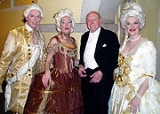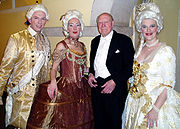
Charles Farncombe
Encyclopedia

Conducting
Conducting is the art of directing a musical performance by way of visible gestures. The primary duties of the conductor are to unify performers, set the tempo, execute clear preparations and beats, and to listen critically and shape the sound of the ensemble...
.
For London audiences, the conductor Charles Farncombe was primarily associated with the productions of the Handel Opera Society, which he helped found and of which he was musical director for the whole of its 30-year existence, from 1955 onwards (in 1977 it was renamed Handel Opera). He was subsequently conductor of the fundraising concerts of the Malcolm Sargent Festival Choir. His work outside Britain covered a wider range of repertory, though still with an emphasis on vocal music, while near his home in Monmouthshire
Monmouthshire (historic)
Monmouthshire , also known as the County of Monmouth , is one of thirteen ancient counties of Wales and a former administrative county....
he founded and directed an annual festival of music and drama remarkable in its scope.
Background
Farncombe was born in London and received his early musical training as a chorister at Canterbury CathedralCanterbury Cathedral
Canterbury Cathedral in Canterbury, Kent, is one of the oldest and most famous Christian structures in England and forms part of a World Heritage Site....
. He continued his education at Dulwich College and at Imperial College, London, where in 1940 he took a degree in civil engineering. After two years of work in that field with John Mowlem and Co.
Mowlem
Mowlem was one of the largest construction and civil engineering companies in the United Kingdom. Carillion bought the firm in 2006.-History:Founded by John Mowlem in 1822, the company was awarded a Royal Warrant in 1902 and went public on the London Stock Exchange in 1924. It acquired SGB Group in...
(involved in the laying of cats' eyes), he saw service in the second world war as captain of a tank recovery unit (21st Army Group) with the Royal Electrical and Mechanical Engineers. A severe wound received at Caen ended his active involvement and left him with a slight limp, though it never inhibited his subsequent enjoyment of walking and swimming.
During recuperation, Farncombe decided to change to a musical career, taking up the French horn. He returned to Canterbury to study at the Royal School of Church Music (1947-48), and went on to graduate from the Royal Academy of Music
Royal Academy of Music
The Royal Academy of Music in London, England, is a conservatoire, Britain's oldest degree-granting music school and a constituent college of the University of London since 1999. The Academy was founded by Lord Burghersh in 1822 with the help and ideas of the French harpist and composer Nicolas...
in London (1948-51). Ralph Vaughan Williams encouraged his aptitude for directing amateur choirs, but it was Edward J Dent, professor of music at Cambridge, who pointed Farncombe towards the then neglected repertory of Handel
HANDEL
HANDEL was the code-name for the UK's National Attack Warning System in the Cold War. It consisted of a small console consisting of two microphones, lights and gauges. The reason behind this was to provide a back-up if anything failed....
's operas. With the vital help of the administrative skills of Gwyneth McCleary (secretary of the Board of Trade Choir, which Farncombe then directed), Dent's desire was brought to fruition with a staged production of Handel's Deidamia
Deidamia
Deidamia may refer to:* Deidamia , from Greek mythology.* from Greek mythology, another name for Hippodamia, wife of Pirithous.* Deidamia I of Epirus, wife of Demetrius Poliorcetes* Deidamia II of Epirus, last ruler of the Aeacid dynasty....
(in Dent's English translation) at the St Pancras Assembly Rooms, London, on June 3, 1955.
Handel Opera Society
The Handel Opera Society was then formally established with a view to giving annual productions, which duly followed, with their venue being Sadler's Wells from 1959. Several works were given their first modern revivals - in Britain, if not the world - and Farncombe often had to prepare new performing editions of the music.Not only operas were covered. Dent drew Farncombe's attention to Winton Dean
Winton Dean
Winton Dean is an English musicologist of the 20th century, most famous for his research concerning the life and works—in particular the operas and oratorios—of Handel, as detailed in his book Handel’s Dramatic Oratorios and Masques .Dean was born in Birkenhead...
's advocacy of staging Handel's dramatic oratorio
Oratorio
An oratorio is a large musical composition including an orchestra, a choir, and soloists. Like an opera, an oratorio includes the use of a choir, soloists, an ensemble, various distinguishable characters, and arias...
s (powerfully expressed in Dean's published study of 1959), which required use of the chorus, and in its early years the society's productions of such works as Semele
Semele
Semele , in Greek mythology, daughter of the Boeotian hero Cadmus and Harmonia, was the mortal mother of Dionysus by Zeus in one of his many origin myths. In another version of his mythic origin, he is the son of Persephone...
, Hercules
Hercules
Hercules is the Roman name for Greek demigod Heracles, son of Zeus , and the mortal Alcmene...
and Theodora
Theodora
Theodora is a name of Greek origin, meaning "God's gift". It is the feminine form of the Greek name, Θεόδωρος meaning "God's gift" , neuter gender...
were as revelatory as those of the Italian operas.
An important landmark came in 1961, when the London production of Rinaldo
Rinaldo
Rinaldo may refer to:*Rinaldo , an Italian opera by George Frideric Handel*Rinaldo , a cantata by Johannes Brahms*Rinaldo , a character in Torquato Tasso's Jerusalem Delivered...
was taken abroad, to the Komische Oper in Berlin and the Handel Festival, Halle
Handel Festival, Halle
The Handel Festival in Halle is an international music festival, concentrating on the music of George Frideric Handel, in the composer's birthplace in Sachsen-Anhalt, Germany. The festival was founded in 1922 and grew into a center of Handel studies and performance in Europe...
.
Farncombe was able to engage many of the best singers of the time for leading roles, including Joan Sutherland
Joan Sutherland
Dame Joan Alston Sutherland, OM, AC, DBE was an Australian dramatic coloratura soprano noted for her contribution to the renaissance of the bel canto repertoire from the late 1950s through to the 1980s....
, Jennifer Vyvyan, Heather Harper
Heather Harper
Heather Harper CBE is a Northern Ireland-born British operatic soprano.She was born in Belfast, Northern Ireland in 1930, where she received her early musical training...
, Janet Baker
Janet Baker
Dame Janet Abbott Baker, CH, DBE, FRSA is an English mezzo-soprano best known as an opera, concert, and lieder singer.She was particularly closely associated with baroque and early Italian opera and the works of Benjamin Britten...
, Elizabeth Harwood
Elizabeth Harwood
Elizabeth Harwood was an English lyric soprano. After a music school, she enjoyed an operatic career lasting for over two decades and worked with such conductors as Colin Davis and Herbert von Karajan...
, Alexander Young
Alexander Young
Alexander Young VC was an Irish recipient of the Victoria Cross, the highest and most prestigious award for gallantry in the face of the enemy that can be awarded to British and Commonwealth forces.A native of Oranmore, County Galway, Young joined the Queen's Bays on 22 May 1890 at Renmore...
, Richard Lewis and Geraint Evans
Geraint Evans
Sir Geraint Llewellyn Evans was a Welsh baritone or bass-baritone noted for operatic roles including Figaro in Le nozze di Figaro, Papageno in Die Zauberflöte, and the title roles in Falstaff and Wozzeck...
. Some of the society's productions were taken to other festivals, including Göttingen
Göttingen
Göttingen is a university town in Lower Saxony, Germany. It is the capital of the district of Göttingen. The Leine river runs through the town. In 2006 the population was 129,686.-General information:...
, Halle, Herrenhausen and Liège. Farncombe's musical direction, though sometimes tending to attract the adjective "efficient", was usually animated without loss of dignity at fast tempos, and he could bring great depth of expression to slower numbers.
Like many pioneering organisations, the Handel Opera Society was to some extent a victim of its own success. As Handel's operas and oratorios became more familiar, critical tolerance of the variable quality of the society's productions diminished, especially after English National Opera
English National Opera
English National Opera is an opera company based in London, resident at the London Coliseum in St. Martin's Lane. It is one of the two principal opera companies in London, along with the Royal Opera, Covent Garden...
's Giulio Cesare
Giulio Cesare
Giulio Cesare in Egitto , commonly known simply as Giulio Cesare, is an Italian opera in three acts written for the Royal Academy of Music by George Frideric Handel in 1724...
set a new benchmark in 1979. The society also ignored the implications of the new approach to "early music" led by period-instrument groups, though Farncombe himself worked with period instruments in some productions for Lina Lalandi's English Bach Festival, including the first modern revival of the 1754 version of Rameau's Castor et Pollux
Castor et Pollux
Castor et Pollux is an opera by Jean-Philippe Rameau, first performed on 24 October 1737 at the Académie royale de musique in Paris. The librettist was Pierre-Joseph-Justin Bernard, whose reputation as a salon poet it made. This was the third opera by Rameau and his second in the form of the...
in 1981 (it was recorded by Erato). Little else of his operatic performance legacy is preserved in audio recordings, though the Handel Opera Society’s performance of Rodelinda (with Joan Sutherland
Joan Sutherland
Dame Joan Alston Sutherland, OM, AC, DBE was an Australian dramatic coloratura soprano noted for her contribution to the renaissance of the bel canto repertoire from the late 1950s through to the 1980s....
and Janet Baker
Janet Baker
Dame Janet Abbott Baker, CH, DBE, FRSA is an English mezzo-soprano best known as an opera, concert, and lieder singer.She was particularly closely associated with baroque and early Italian opera and the works of Benjamin Britten...
) is available on Opera d'Oro.
Thus, the Arts Council's decision to discontinue their annual grant to the society after 1984 was not altogether surprising. The coincident demise of the Greater London Council, the other main source of funding, sealed the society's fate. In its dying days the GLC did, however, provide enough to enable the society to finish its operations in the Handel anniversary year of 1985 with a final novelty: the British premiere of Rodrigo
Rodrigo
Rodrigo is a Spanish, Portuguese, and Italian name derived from the Germanic name Roderick . It may refer to:-Given name:*King Rodrigo, the last Visigothic king of Hispania...
, Handel's first Italian opera.
Outside Britain
Farncombe's most important appointment outside Britain was that of chief conductor of the historic Royal Court Theatre at Drottningholm, Stockholm, from 1968 to 1979, where he helped to bring that remarkably preserved baroque theatre to working life. His success there, and at the Royal Swedish Opera, gained him the gold medal of the Friends of Drottningholm and a Swedish knighthood (Knight Commander of the Royal Swedish Order of the North Star). He was also conductor of the Handel festival at the Badisches Staatstheater, Karlsruhe, from 1985 to 1995, his experience again valuable in the development of a new venture. In 2001, he was invited to return to Karlsruhe for the 25th anniversary of the Handel festival to conduct Handel's OttoneOttone
Ottone, re di Germania is an opera by George Frideric Handel, to an Italian–language libretto adapted by Nicola Francesco Haym from the libretto by Stefano Benedetto Pallavicino for Antonio Lotti's opera Teofane. It was the first new opera written for the Royal Academy of Music 's fourth season...
.

